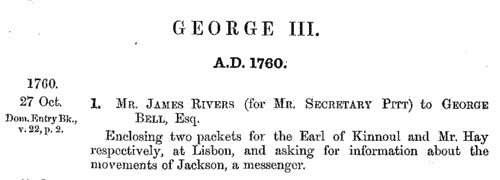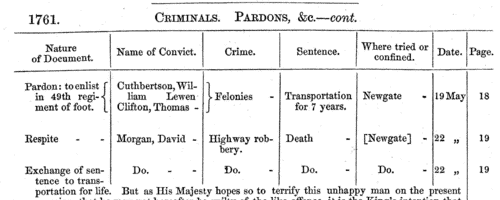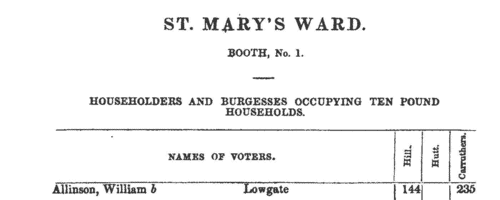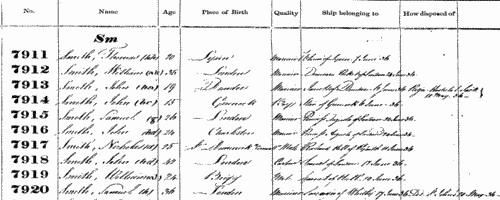Worrill Surname Ancestry ResultsOur indexes 1000-1999 include entries for the spelling 'worrill'. In the period you have requested, we have the following 18 records (displaying 1 to 10): Single Surname Subscription | | | Buying all 18 results of this search individually would cost £112.00. But you can have free access to all 18 records for a year, to view, to save and print, for £100. Save £12.00. More... |
These sample scans are from the original record. You will get scans of the full pages or articles where the surname you searched for has been found. Your web browser may prevent the sample windows from opening; in this case please change your browser settings to allow pop-up windows from this site.  Masters of Apprentices registered at Colchester in Essex
(1750-1754) Masters of Apprentices registered at Colchester in Essex
(1750-1754)
Apprenticeship indentures and clerks' articles were subject to a 6d or 12d per pound stamp duty: the registers of the payments usually give the master's trade, address, and occupation, and the apprentice's name, as well as details of the date and length of the apprenticeship. There are central registers for collections of the stamp duty in London, as well as returns from collectors in the provinces. These collectors generally received duty just from their own county, but sometimes from further afield. (The sample entry shown on this scan is taken from a Norfolk return)WORRILL. Cost: £8.00.  | Sample scan, click to enlarge

| Thieves imprisoned in Lincoln
(1760-1761)
This calendar of Home Office papers was edited by Joseph Redington and published in 1878. The period covered by this index is from the accession of king George III, 25 October 1760, to 31 December 1761. The documents abstracted were a part of the great archive called the State Papers Domestic, and comprised letters to and from the Secretaries of State, and other letters; reports; memorials and petitions; and warrants of various kinds. Some repetitive material was reduced into tables. We have teased out this diverse and heterogeneous material into separate indexes for each subject. WORRILL. Cost: £4.00.  | Sample scan, click to enlarge

| Convicted Criminals
(1761)
When Joseph Redington, Assistant Keeper of the Public Records, calendared the Home Office papers from the accession of king George III, 25 October 1760, to the end of 1765, he gathered together references to criminals from the State Papers Domestic, Warrant Books, and Criminal Papers, and these were printed in tabular form. The information is set out in four sections: -
1. Letters to Judges: giving name of the judge; name of the convict; crime; sentence; where tried or confined; date; page.
2. Petitions in Favour: stating from whom; name of convict; crime; sentence; where tried or confined; object of petition (such as pardon or commutation); date.
3. Reports or Certificates of the Judges, chiefly addressed to the king, on the Cases of Criminals: with name of judge; name of criminal; crime; sentence; where tried or confined; condition of pardon.
4. Warrants and Letters relating to Criminals convicted, being Pardons, Respites &c.: with nature of document; name of convict; crime; sentence; where tried or confined; date; page.
The names of the criminals were not included in the printed index to the calendars, but we have now indexed them year by year.WORRILL. Cost: £6.00.  | Sample scan, click to enlarge

|  Masters of clerks and apprentices
(1766) Masters of clerks and apprentices
(1766)
Apprenticeship indentures and clerks' articles were subject to a 6d or 12d per pound stamp duty (late payment of the 6d rate attracted double duty (D D) of 12d): the registers of the payments usually give the master's trade, address, and occupation, and the apprentice's name, as well as details of the date and length of the apprenticeship. 2 January to 15 July 1766.WORRILL. Cost: £8.00.  | Sample scan, click to enlarge

|  Apprentices
(1768) Apprentices
(1768)
Apprenticeship indentures and clerks' articles were subject to a 6d or 12d per pound stamp duty (late payment of the 6d rate attracted double duty (D D) of 12d): the registers of the payments usually give the master's trade, address, and occupation, and the apprentice's name, as well as details of the date and length of the apprenticeship. 1 January to 3 December 1768.WORRILL. Cost: £8.00.  | Sample scan, click to enlarge

|  Masters of clerks and apprentices
(1780) Masters of clerks and apprentices
(1780)
Apprenticeship indentures and clerks' articles were subject to a 6d or 12d per pound stamp duty: the registers of the payments usually give the master's trade, address, and occupation, and the apprentice's name, as well as details of the date and length of the apprenticeship. 3 January to 30 December 1780. IR 1/30WORRILL. Cost: £8.00.  | Sample scan, click to enlarge

|  Masters of clerks and apprentices
(1786) Masters of clerks and apprentices
(1786)
Apprenticeship indentures and clerks' articles were subject to a 6d or 12d per pound stamp duty: the registers of the payments usually give the master's trade, address, and occupation, and the apprentice's name, as well as details of the date and length of the apprenticeship. 10 February to 31 December 1786. IR 1/33WORRILL. Cost: £8.00.  | Sample scan, click to enlarge

| Workers at Houldsworth's Cotton Mill, Manchester
(1818)
The minutes of evidence taken before the Lords Committee on the Cotton Factories Bill include a series of reports by medical men as to the general health of the mill workers in April 1818. For each factory there is a complete list of workers, giving full name, age, how long employed in a factory, health (in general terms, such as 'Good' or 'Sickly'), and any chronic disease or 'distortion', cause and duration - with slight variations from report to report. The physicians examined several hundred people each day, asking such questions as 'Have you any swellings or sores anywhere?', 'Are your limbs straight?', 'Have you a good appetite for food?', 'Do you conceive yourself to be in good health?', and all concluded that the health of the mill workers was good, and that the workers were cheerful. This is the report for Thomas Houldsworth's cotton spinning factory, Manchester, 27 April 1818.WORRILL. Cost: £6.00.  | Sample scan, click to enlarge

| Electors in Hull
(1835)
A poll was taken 6 and 7 January 1835 for the election of members to serve in Parliament for the borough of Kingston-upon-Hull, the candidates being Matthew Davenport Hill, William Hutt and David Carruthers. This poll book lists all the electors in the wards of Hull (St Mary's, North, Trinity, Whitefriar, Humber, Austin, and South Myton), in Sculcoates, and in Sutton, Southcoates, Drypool &c. In each ward the names are arranged in five sections: Householders and Burgesses occupying Ten Pound Households; Burgesses not occupying Ten Pound Households; Unpolled Voters residing in the ward; Unpolled Freemen; and Non-Resident Freemen not polling. There are also short lists of votes that were tendered but the validity of which remained uncertain. In all cases full names and addresses are given: where electors voted, their votes are indicated in the right-hand columns, the numbers shown there being their numbers in the cumulating totals for each candidate. After the name of each voter there is an italic a or b showing whether he voted on the first or second day. WORRILL. Cost: £4.00.  | Sample scan, click to enlarge

|  British merchant seamen
(1835-1836) British merchant seamen
(1835-1836)
At this period, the foreign trade of ships plying to and from the British isles involved about 150,000 men on 15,000 ships; and the coasting trade about a quarter as many more. A large proportion of the seamen on these ships were British subjects, and so liable to be pressed for service in the Royal Navy; but there was no general register by which to identify them, so in 1835 parliament passed a Merchant Seamen's Registration Bill. Under this act this large register of British seamen was compiled, based on ships' crew lists gathered in British and Irish ports, and passed up to the registry in London. Each seaman was assigned a number, and the names were arranged in the register by first two letters of the surname (our sample scan shows one of the pages for 'Sm'); in addition, an attempt was made to separate out namesakes by giving the first instance of a name (a), the second (b), and so on. But no effective method was devised to prevent the same man being registered twice as he appeared in a second crew list; moreover, the original crew lists were clearly difficult for the registry clerks to copy, and some of the surname spellings appear to be corrupted. A parliamentary committee decided that the system devised did not answer the original problem, and this register was abandoned after less than two years: but it is an apparently comprehensive source for British merchant seamen in 1835 to 1836. The register records the number assigned to each man; his name; age; birthplace; quality (master, captain, mate, 2nd mate, mariner, seaman, fisherman, cook, carpenter, boy &c.); and the name and home port of his ship, with the date of the crew list (usually at the end of a voyage). Most of the men recorded were born in the British Isles, but not all (for instance, Charleston and Stockholm appear in the sample scan). The final column 'How disposed of' is rarely used, and indicates those instances where a man died, was discharged, or deserted his ship during the voyage.WORRILL. Cost: £8.00.  | Sample scan, click to enlarge

|
| 1 | 2 |  |
Research your ancestry, family history, genealogy and one-name study by direct access to original records and archives indexed by surname.
|













